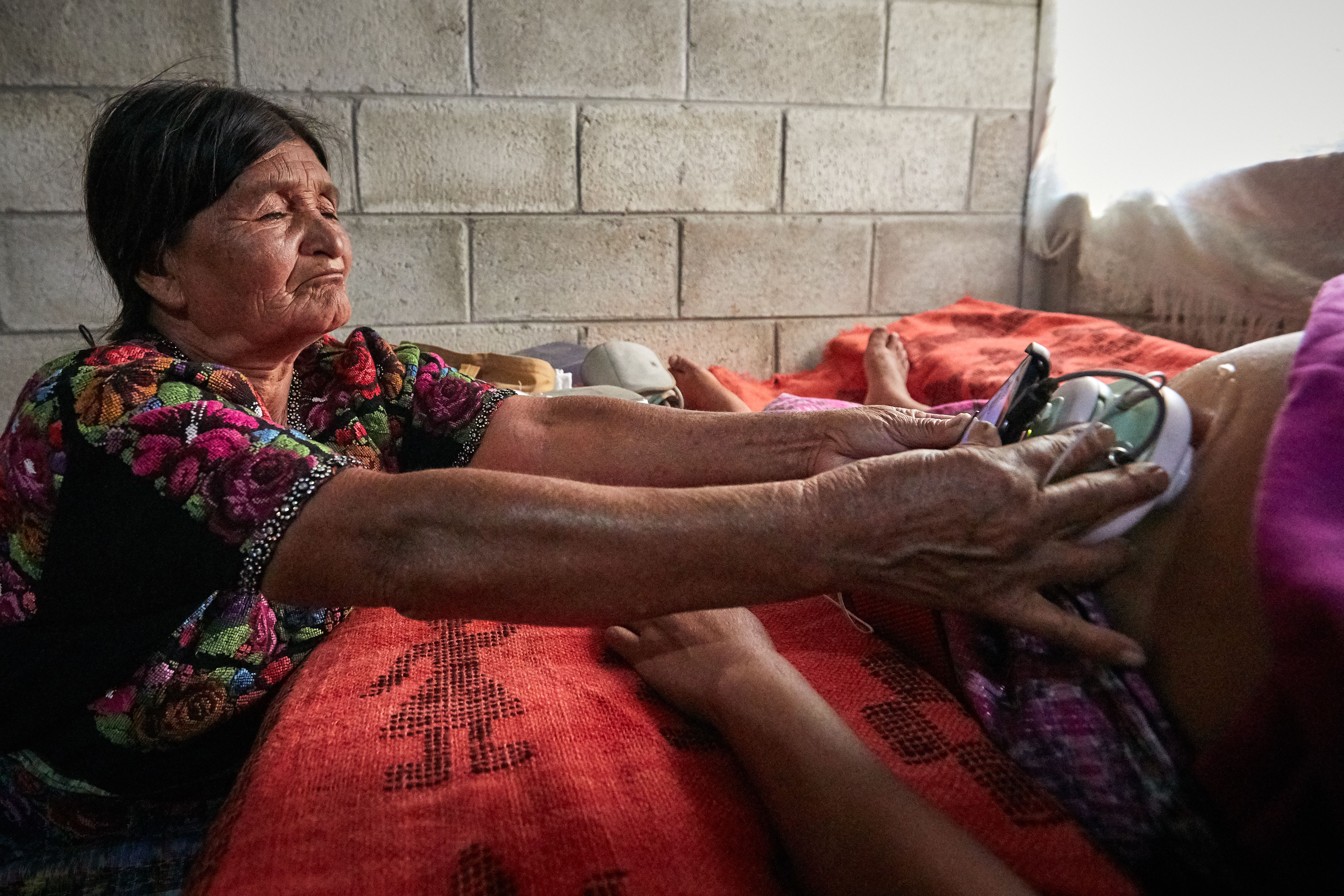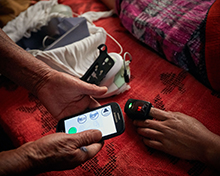
Credit: Photo courtesy of Maya Health Alliance and Bryan Watt/Photographers Without Borders. Reuse is not allowed.
Pregnancy, labor, and delivery can be difficult experiences, even for women with access to prenatal care and state-of-the-art obstetrical services. For those in low-income countries who live in rural areas or come from marginalized communities, such as Mayan women in Guatemala, these difficulties often have life-or-death consequences. One NIH-supported project is working to improve outcomes for these women.
"Guatemala has one of the highest rates of maternal deaths in the world," said Gari Clifford, D.Phil., an NIH grantee from Emory University and the Georgia Institute of Technology 
Dr. Clifford's project is supported by the Fogarty International Center and NICHD as part of the mHealth program, which develops innovative mobile health tools specifically for low- and middle-income countries. Dr. Clifford's project started 6 years ago when, with co-investigators Dr. Rachel Hall-Clifford and Dr. Peter Rohloff, as well as the community midwives, they created a low-cost ultrasound screening tool. A blood pressure cuff and pulse oximeter, paired with a mobile app, enables screening for pregnancy complications, including preeclampsia, intrauterine growth restriction, and fetal distress.
Importantly, the app is designed for midwives who do not have formal medical training, and in some cases, do not know how to read. It contains step-by-step pictures for easy use and consistent procedures. The information the app collects synchronizes with Maya Health Alliance's existing medical record system, meaning rural healthcare providers can easily locate patient data, track progress from previous visits, and schedule future visits or screenings.
"Even in rural areas, mobile connectivity is surprisingly good. In the areas we serve, our app will, at a minimum, send a text message to request help. The system is also designed to upload more complex data automatically if there's a strong enough cellphone tower nearby, like when the midwife returns home later in the day. The app also automatically connects the midwife to 24-hour clinical support via voice calls, for which there is almost as much coverage as for text messaging," explained Dr. Clifford.

The mobile system in use.
Credit: Photo courtesy of Maya Health Alliance and Bryan Watt/Photographers Without Borders. Reuse is not allowed.
To test the platform, Dr. Clifford's team partnered with Maya Health Alliance 

Three years after the project started, Dr. Clifford and his team published findings showing that their mobile platform spurred meaningful improvements in detecting pregnancy and childbirth complications and in timely referral of patients to hospital care. Today, Maya Health Alliance continues to use the system Dr. Clifford and colleagues developed as their standard of care. Notably, they reported no maternal deaths between 2018 and 2020.
"Maya Health is constantly working to develop practical solutions to improve our patients' care and health outcomes," said Maya Health Alliance Executive Director Anne Kraemer. "We are immeasurably grateful for the opportunity to partner with Dr. Clifford and his team to empower traditional Kaqchikel-speaking midwives with tools to increase safe and healthy births—and literally save lives—in rural Guatemala."
Ms. Kraemer shared a story of one patient they helped during the COVID-19 pandemic. The patient had high blood pressure, blurred vision, and headaches that worsened as her pregnancy progressed. The patient's midwife, who had been monitoring the symptoms with the mobile app, suspected preeclampsia and urged her to go to the hospital. However, the patient was reluctant to make the journey because of the pandemic and travel restrictions. With help from a care navigator, she got to the hospital, far from her own community, where she was diagnosed with preeclampsia and delivered via Cesarean section. Mother and baby are doing well, and the patient occasionally calls the mobile health team to express her continued gratitude.
"I really appreciate the funding from NICHD and Fogarty, which catalyzed this idea into a fully working system. The app now covers the postpartum period as well," said Dr. Clifford. "Our goal is to expand the platform to capture data and address additional perinatal care issues. We want to bring this tool to scale across Guatemala and beyond."

 BACK TO TOP
BACK TO TOP